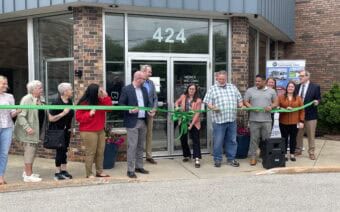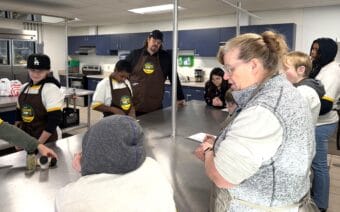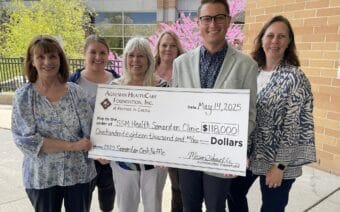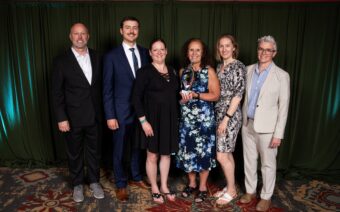
December 13, 2023
GREEN BAY – Northeast Wisconsin’s only ambulatory surgery center (ASC) focused solely on orthopedic procedures, has recently been recognized by Newsweek magazine as one of America’s Best Ambulatory Surgery Centers 2024.
The Orthopedic Surgery Center of Green Bay – part of Orthopedic & Sports Medicine Specialists (OSMS) – is one of only nine ASCs in Wisconsin to have received this recognition.
The list recognizes the leading 550 ASCs in the U.S. based on quality of care, performance data and peer recommendations, relative to in-state competition.
“This recognition is a testament to the unwavering dedication and hard work of our team,” Amanda Sosnosky, ASC administrator at OSMS said. “Driven by the highest safety standards, our group of highly skilled and experienced healthcare professionals is committed to delivering top-notch medical care to all our patients.”
Sosnosky said the top priority of OSMS’ ASC is providing patients with the best possible experience throughout their treatment journey.
“We do everything within our power to ensure that patients avoid unnecessary complications, recover quickly and resume their normal lives as soon as possible,” she said.
Ben Zellner, a hand-to-shoulder specialist, physician-owner of OSMS and medical director at the Orthopedic Surgery Center of Green Bay, said it means a lot to be recognized as one of the best ASCs in the country.

Ben Zellner
“We strive to provide a good patient experience, and this recognizes that the data supports that (those experiences are) consistent with some of the other top surgery centers in the country,” he said. “For patients, this (recognition) means that this is an entity that has been doing this for a long time. We’ve fine-tuned all the details of their care to make things move as smoothly as possible and hopefully provide better outcomes for those patients who receive their care at our facilities.”
Review process
According to Newsweek guidelines, there is a two-step process in determining who makes the list – which includes an ambulatory surgery center employee survey and a review of quality metric data.
“They look at vaccination rates among employees for COVID-19, the flu, etc.,” Sosnosky said. “They look at quality outcomes based on orthopedics specifically after discharge from the facility, post surgery ER visits, if there were any avoidable complications they look to see that steps were taken to ensure they were prevented, they look at infection rates and other similar things from a quality standpoint.”
Sosnosky said OSMS has a postoperative infection rate of 0.15%, which is significantly lower than the national ASC average of 0.85% and the hospital average of 2.5%.
Zellner said there is a good reason for that.
“From the moment a patient signs up for surgery with us they receive their instructions, along with testing or pre-operative screening to make sure they’re optimized for surgery,” he said. “A lot of (the lower infection rate) comes down to the health of a patient and the care that they receive along the way.”
Some patients, Zellner said, may be at a higher risk for infection.
For example, he said people who have less-controlled medical conditions that might predispose them to infection – such as uncontrolled diabetes or people who are generally less healthy overall – can certainly have a higher risk of infection.
“Those patients are not necessarily candidates for surgery at a surgery center,” he said.
In a way, Zellner said, surgery centers should have a much lower infection rate because they treat the healthiest patients.
“(So), you’re starting out with a cohort of people that should have less risk for infection,” he said.
Team effort preparation process
Sosnosky said OSMS makes certain that their surgery centers are carefully preparing patients from both a pre-op and post-op standpoint.
“Our care team makes sure our patients are well-prepared for surgery,” she said. “We talk about nutrition and make sure they’re eating well. We have them shower with certain soap the night before and the morning of surgery. We make sure they’re washing their sheets and wearing clean pajamas. We really get into the nitty-gritty of any aspect you can think of related to infection prevention.”
Sosnosky said the center has a very robust program, and monitors all patients post-operatively for three months to make sure that they’re healing well.

Amanda Sosnosky
“We get information directly from the physician’s office notes, so if a patient, for example, doesn’t follow up with the routine after-visit care, we’re going to be reaching out to that individual to make sure that they are healing and they are doing well,” she said. “(Making sure) they’ve met the benchmarks we’re looking for from a recovery and mobility standpoint, especially after a total joint surgery.”
Procedures and surgeries performed at the Orthopedic Surgery Center of Green Bay and at their Fox Valley location, Sosnosky said, include – but are not limited to:
Shoulder, knee, and hip total joint replacementsPartial joint replacements,Arthroscopy (scopes)ACL reconstructionCollarbone surgeryAchilles tendon repairHand, wrist, and elbow surgeriesHand, foot and ankle surgeries.
Sosnosky said OSMS has grown organically over the years – after starting as two independent, physician-owned orthopedic clinics – Orthopaedic Associates of Green Bay and Green Bay Orthopedics.
For decades these two practices worked as separate businesses.
In 2004, Sosnosky said Green Bay Orthopedics added rheumatology to its practice to better serve the musculoskeletal needs of the community.
Shortly after, Sosnosky said the two practices recognized their philosophies of care and the skill level of their physicians aligned and in January 2008, the two practices officially joined forces, becoming known as OSMS: Orthopedic & Sports Medicine Specialists of Green Bay.
Operating in two separate buildings initially, the practice built a cohesive specialty facility for bone, muscle and joint care in 2010.

Dr. Ben Zellner said The Orthopedic Surgery Center of Green Bay strives to provide a good patient experience. Submitted Photo
This full-service clinic included orthopedics, rheumatology, X-ray, MRI, infusion therapy and an outpatient center, which encompasses the ambulatory surgery center.
Today, Sosnosky said OSMS has 20 orthopedic surgeons, six rheumatologists and three pain management physicians.
In addition to the Green Bay location, Sosnosky said OSMS has a full-service orthopedic and rheumatology clinic and orthopedic outpatient ambulatory surgery center in the Fox Valley, located in Neenah.
They also offer orthopedic, rheumatologic and pain management care at clinics in Marinette, Chilton, Oconto Falls and Oshkosh.
“We can treat any orthopedic or rheumatologic patient, as well as those who need pain management,” Sosnosky said. “The doctors are going to provide the least invasive services first and make sure that surgery is definitely a recommendation before utilizing either of our ASCs.”
Sosnosky said OSMS offers a full range of those services in Northeast Wisconsin and the Upper Peninsula.
“We don’t currently have surgeons who perform back surgery, but (do offer) pain management as far as different radio-frequency ablation procedures, spinal cord stimulator procedures and even a slew of injections and nerve-blocking procedures are offered through our pain management services,” she said.
Patient care still the focus
Sosnosky said the past 13 years of growth in Northeast Wisconsin and Michigan’s Upper Peninsula has allowed them to better serve patients.
Their “scrubs over suits” management approach, Zellner said, has proven to be beneficial for everyone involved – which means the providers who wear the scrubs and treat the patients are also the ones making the decisions.
“We like to think that having providers make the decisions for their patients, helps provide for the best patient experience,” he said. “We believe it’s better for people who have patient contact and who treat the patient to be the ones making the decisions, rather than people who may not ever see a patient face-to-face making decisions on how to run a medical practice. We know what the patient can experience and know where to optimize our focus and our resources to provide better care.”
Zellner said he is most proud of two things – patient care and the fact that all their physicians live in the communities where they work.
“There’s a trend or tendency these days for hospitals, particularly in certain parts of the country, to hire people to work at their facilities, but they don’t live in the community,” he said. “They come in as a local, independent provider and provide care for any number of things, whether it’s orthopedic surgery or neurology. But they’ll have providers who are there on a temporary basis and live somewhere else.”

Amanda Sosnosky said the OSMS team does everything it can to ensure that patients avoid unnecessary complications, recover quickly and resume their normal lives as soon as possible. Submitted Photo
Zellner said he’s proud that all of OSMS’ physicians live here, with many of them from the area themselves.
“We live here, we contribute to the community and we’re able to provide care for the community we live in,” he said. “That’s a distinction I’m proud of.”
Some of the more gratifying care that OSMS provides, Zellner said, is when “we have a neighbor or a friend of a friend or somebody that we know in the community we’re familiar with who we have as a patient.”
“We always want to have excellent outcomes, but it’s important to me that we’re providing care that our neighbors would benefit from and speak highly of, and who would send their friends to us,” he said. “We earn our business here at OSMS through word of mouth, so when patients continue to return and they send their friends, there’s no higher honor. To have that be people in our own community is an honor.”
Zellner said growth isn’t necessarily on their radar – at least for now – especially since they’ve expanded significantly over the past eight years.
“I do think this (recognition) would suggest that if we were to expand we would do it in a way that’s responsible and still provide a similar level of care,” he said. “That’s a challenge with growing so quickly. We like to think we provide excellent care at this facility (in Green Bay), and we like to translate that to every location we expand to. I don’t necessarily think it would mean that we should expand, but we will continue to respond to the needs of the community to try to provide this type of care wherever it might be needed.”
 GRB’s United Airlines team honored with safety award
GRB’s United Airlines team honored with safety award UWEC announces Rural Health Innovation Alliance
UWEC announces Rural Health Innovation Alliance








